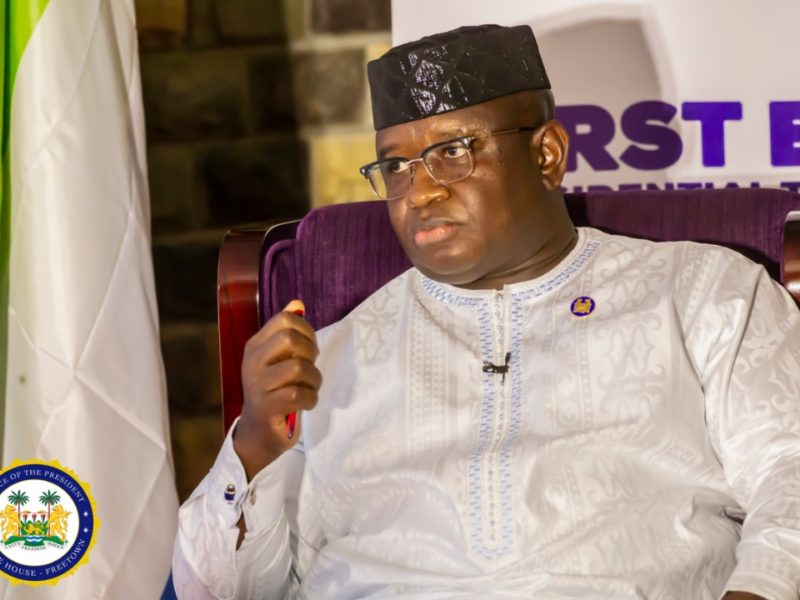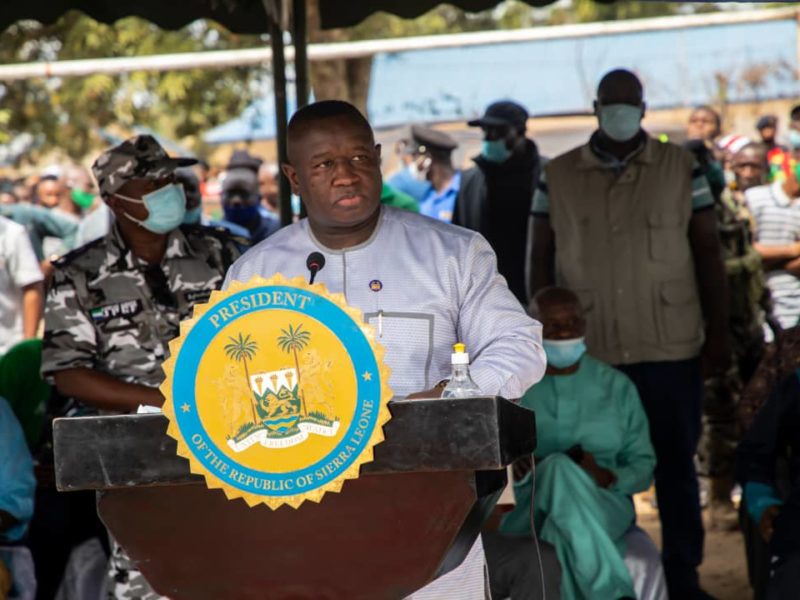ABC Boss advises civil servants “Come to work early”
National Coordinator and Second-in-Command of Attitudinal and Behavioural Change (ABC) Secretariat has proffered nationalistic advises to her colleague civil servants in Sierra Leone. (Photo: Mr. Abdulai Bayraytay, Chairman of the occasion)
Nanette Thomas was addressing hundreds of civil servants last week at the Miatta Conference Hall in Freetown when she pointed out that if all civil servants play their roles accordingly, the whole system will improve and Sierra Leone will become a better place for all.
At the forum organised by the ABC Secretariat in consultation with the Ministry of Information and Communications, which attracted various officials of the civil service, Madam Thomas advised civil servants to observe punctuality at work.
“Come to work early so that you are actually at your desk on time,” she advised, while stressing the must for civil servants to remain professionals and properly execute the laws and procedures governing their various departments.
“Do your job to the best of your knowledge and ability and do not expect sweeteners,” the ABC Second-in-Command pointed out.
She explained that the roles and responsibilities of civil servants are enshrined in the Civil Service Code, noting that the civil service has no separate constitutional personality or responsibility.
“The duty of a civil servant is to the minister in charge of the department where they are serving. A change of minister does not involve a change in staff,” she stated, adding: “The Civil Service carries out the practical and administrative work of government. Civil servants are politically impartial employees, who carry out the policies of the government departments under the control of elected ministers”.
Madam Thomas admonished civil servants to consciously change their thinking to take on what she referred to as ‘winner’s thoughts’.
“We must continue the quest and realize we must also get a new attitude, a new perspective, a new way of looking at Mama Salone and a new mind set,” she emphasized.
She called on all to think outside the box. “Let us think outside our agenda; Let us think outside our political parties; our focus should be Mama Salone and how we can make it a better place for our children and grandchildren”.
According to her, negative attitude shortens ones life. She stated thus: “The more often you become angry, rude, upset or frustrated, the fewer days you will have to live. Negative attitude is self-defeating. If you are always blaming someone or something you will never find a solution. Negative attitude is extremely destructive to your personal development. Your attitude and thoughts affect your life and the people around you”.
To avoid negative attitude and to overcome challenged attitudes, she said, one must work on his/her personal foundation, namely the five pillars of attraction – finances, relationship, environment, spirituality and health; otherwise known as FRESH.
She noted that if one improves on his/her five pillars of attraction, he/she will definitely change the negative attitude to a positive attitude.
In his statement at the one-day workshop for civil servants, the Director of Public Sector Reform Unit, Julius Sandy said “the relationship between politicians and civil servants, otherwise known as Politics-Bureaucracy Divide/Relationship is arguably the most discussed, and yet the least understood construct in both the Art and Science of Politics”.
According to him, a strong partnership between administrators and politicians can result in a plus-sum or win-win game, where both groups can strengthen their positions and their output.
“It is often said that the traditional role of civil servants in a Ministry is limited to being administrative heads of departments, advising ministers, and implementing government policies,” he said.
Sandy added however that the modern civil servant performs much more than his/her traditional role.
“However, whether they are managing the administrative machinery or executing policies, or offering advices to the minister, they remain under political superintendence, and their primary allegiance is to the government of the day, served through the appointed political minister of the department,” he explained, adding: “It is therefore both desirable and necessary that civil servants and ministers cultivate a sustainable trustworthy relationship”.
According to the Public Sector Reform Unit Director, if there is disharmony between a civil servant and his/her Minister, genuine advice against impracticable or ill-conceived projects which often are political promises to the electorate is considered sabotage; ordinary bureaucratic procedures and practices are considered delaying tactics; strict financial control is considered undermining.
He emphasized thus: “It is therefore necessary that trust is mutually cultivated. Without the trust of the minister, it becomes extremely difficult for the civil servant to exercise departmental control and manage effectively”.
He said: “In the administration of Ministries, Civil Servants, particularly Permanent Secretaries may be at the apex of the managerial system, but the minister has to answer for and explain to parliament and the public, and is held responsible for every success and/or failure of departmental policy and administration.”
Speaking on the way forward, Sandy said the roles of all parties should be clearly defined, documented and made available to all parties.
Politicians and civil servants, he said, must tread lightly and in tandem.
According to him, standing rules and procedures to guide the behaviour of the minister and civil servant must be provided.
He said induction training on appointment, then regular dialogue, joint seminars, workshops and retreats for ministers and senior civil servants to promote interaction improve understanding of problems associated with each position and build confidence, must be organised.
He proffered several other advises as to the way forward.
At the end of the workshop that lasted for a whole day, guests and participants commended the Chairman of the occasion, Mr. Abdulai Bayraytay, for successfully and professionally manning the day’s affair.
Bayraytay was originally scheduled to chair the workshop’s technical or second session only, but was suddenly called upon to chair the opening session in the absence of the opening session’s substantive chair.
With eloquence, dynamism and professionalism, Bayraytay successfully chaired both session to the admiration of all present.
ABC Communications Office
Stay with Sierra Express Media, for your trusted place in news!
© 2012, https:. All rights reserved.





